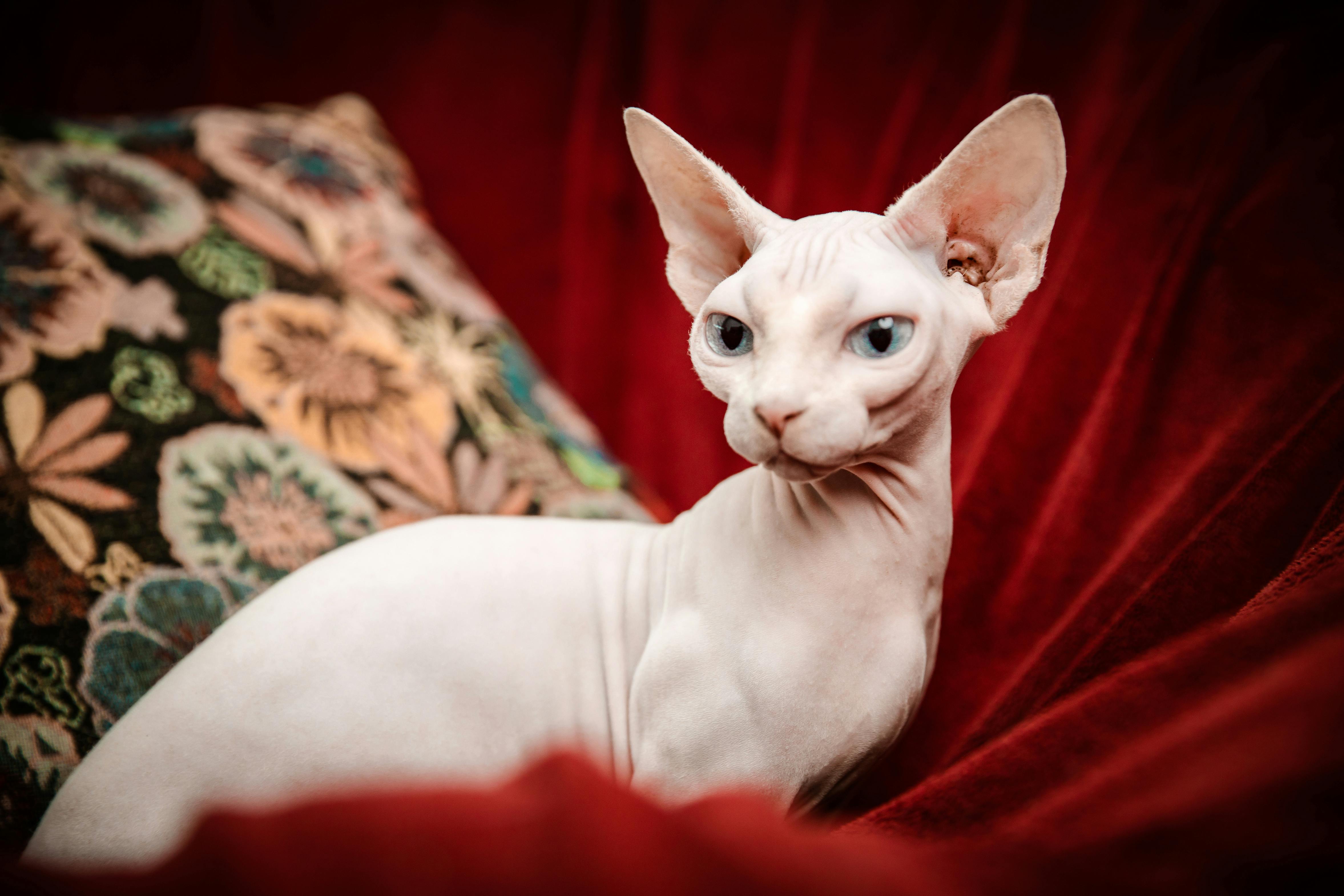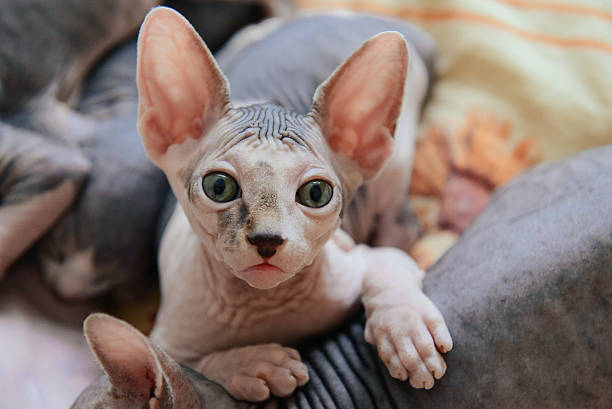Sphynx

History:
The Sphynx cat is a unique and instantly recognisable breed known for its lack of fur. Originating in Canada in 1966, the breed began with a hairless kitten named Prune, born to a domestic shorthair cat due to a natural genetic mutation. Breeders crossed these hairless cats with normal-coated cats and then backcrossed to strengthen the hairless gene while broadening the gene pool. Despite its modern image, hairless cats have been depicted in history as early as pre-Columbian Mexico. The Sphynx is now a well-established breed recognised for its extroverted personality, warm skin, and dog-like affection. They are known for their playfulness, intelligence, and strong human bonding.
Size: Medium-sized cat
Height: 20–25 cm
Weight: 3.5–5.5 kg
Life Expectancy: 9 to 15 years

Breed Appearance:
The Sphynx is a medium-sized cat with a muscular, broad-chested body and a prominent belly that often gives it a pot-bellied look. Despite the name, Sphynx cats are not completely hairless—they typically have a fine layer of peach-fuzz-like down that gives their skin a soft, suede-like texture. Wrinkles are prominent, especially around the shoulders, head, and legs. The breed has large, lemon-shaped eyes and strikingly large ears set wide apart. Its head is wedge-shaped with pronounced cheekbones, and the tail is slender, often described as whiplike. The skin shows the colour and pattern the coat would be—solid, tabby, calico, etc.—if it were present. Their body temperature is slightly higher than that of coated cats, giving them a warm touch.
Health & Care:
Sphynx cats are generally healthy but are prone to certain genetic and breed-specific health issues, including hypertrophic cardiomyopathy (HCM), skin conditions, and dental disease. Regular vet checkups and screenings are essential. Due to their lack of fur, they are more susceptible to cold, sunburn, and skin oil buildup, which can irritate if not managed. Weekly sponge baths or gentle washes are recommended to remove oils. Regular ear cleaning, nail trimming, and dental care are also necessary. A balanced diet, hydration, and an enriching environment contribute to their overall health and well-being.

Living Conditions:
Sphynx cats adapt well to various living environments, including apartments and houses, as long as they remain warm and secure. They are indoor-only cats due to their vulnerability to temperature extremes and sun exposure. This breed thrives on human companionship and enjoys sleeping in warm spots like blankets, heated beds, or their owner’s lap. Because they are highly social, they do best in homes with other pets or people who are home often. Sphynx cats enjoy vertical space, interactive toys, and cosy nooks. A predictable routine and plenty of engagement are key to their emotional and physical comfort.
Grooming:
Unlike other breeds, Sphynx cats require regular skin care rather than traditional brushing. Their skin produces oils that are normally absorbed by fur in other cats, so Sphynx cats need weekly baths to prevent oil buildup, odour, or skin infections. Use a gentle, cat-safe shampoo. Their ears accumulate wax quickly and should be cleaned weekly. Regular nail trims and dental care are also important. Because of their exposed skin, they should be kept warm, avoiding drafts or prolonged sun exposure. While grooming takes commitment, many Sphynx cats enjoy the attention and ritual of cleaning with their humans.

Advantages:
-
Sphynx cats are affectionate, social, and people-oriented companions who form strong bonds with their owners and love cuddling and interaction.
-
Their lack of fur means no shedding and minimal allergens, making them a potential option for people with mild allergies.
-
Highly intelligent and playful, they excel in training, learning tricks, and engaging in puzzle or interactive games that stimulate both body and mind.
-
They adapt well to multi-pet households and are known to be friendly with children, other cats, and even dogs.
-
Their clownish, entertaining personality and warmth-loving nature make them delightful, expressive additions to engaged, affectionate homes.
Disadvantages:
-
Sphynx cats require frequent skin care, including regular baths, which may be time-consuming or difficult for some owners.
-
They are sensitive to temperature changes and must be kept warm, limiting their ability to spend time outdoors and requiring climate-controlled living.
-
Their intense need for attention and companionship can lead to anxiety or destructive behaviours if left alone too long.
-
Though low on fur, they are not maintenance-free and may be prone to skin issues, ear infections, or heart disease that require regular vet attention.
-
Their rarity and health care needs can make them more expensive to adopt and maintain compared to other breeds.

